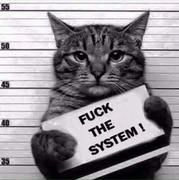CovOps

 Location : Ether-Sphere Location : Ether-Sphere
Job/hobbies : Irrationality Exterminator
Humor : Über Serious
 |  Subject: End the irrational enforcement of infractions for minor offenses Subject: End the irrational enforcement of infractions for minor offenses  Fri Nov 13, 2020 7:36 pm Fri Nov 13, 2020 7:36 pm | |
| Clifton Webb used to live on the streets of Sacramento. He received multiple citations for infractions, like not being able to pay for the bus. Each citation came with hundreds of dollars in unpayable fines.
Without the funds to pay the fare, Clifton had to take the bus to go to court and risk receiving another citation in order to resolve the others. If he did not go, he risked a warrant for his arrest. While unhoused and living with addiction, Clifton was forced to navigate challenging systems and court bureaucracies, making it more difficult to exit homelessness.

Today, Clifton is in recovery. Although he is doing his best, he is still unable to resolve the citations and fears the consequences that await him.
As millions of Americans call to defund police, ending the irrational enforcement of infractions for minor offenses is an essential first step. These infractions are the most low-level violations of the law, punishable only by a fine, that largely criminalize everyday behavior, including sleeping, owning a dog, jaywalking and sitting in public. Although many people have sat down, or walked their dog in public, most have not been cited or harassed by police for doing so.
That’s because these laws are specifically used to target, surveil and punish only certain Californians for simply existing in public space.
A new report I co-authored with the Lawyers’ Committee for Civil Rights of the San Francisco Bay Area reveals the blatant racism behind these laws: California racial profiling data show that Black adults are up to 10 times more likely to receive a citation for a local infraction than white adults. Latino adults were almost six times more likely. And most police activity is in response to nonviolent crime. In Sacramento, police spend only 4 percent of their time responding to violent crime and less than 1 percent of police calls were made for serious crimes in 10 other cities. And, 20 percent of all criminal court filings are for non-traffic infractions.
Routine encounters with police, most officer-initiated, are inherently traumatic, and too often result in the death of the person stopped, with disproportionate killings of Black people.
For example, in February, 2018, Ronell Foster, a 33-year-old Black father of two, was riding his bicycle without a headlight. While riding, an officer in a patrol vehicle pursued Ronell, chased him down a dark alley, tased him, beat him with a flashlight and shot him multiple times in the back and head. He was killed that night by Vallejo Police Department all for an infraction – riding a bike without a headlight.
We spend millions of dollars enforcing infraction laws, even though the infractions’ fines and fees are largely uncollectable: In the 2018-19 fiscal year there was $10.6 billion in outstanding criminal justice debt in California. The debt burden, warrants and arrests cause significant harm to our communities. For example, one unhoused person received a $185 infraction citation for having his tent assembled during the day in Venice Beach, an amount that was obviously impossible for him to pay.
https://www.pe.com/2020/11/12/end-the-irrational-enforcement-of-infractions-for-minor-offenses/

_________________
Anarcho-Capitalist, AnCaps Forum, Ancapolis, OZschwitz Contraband
“The state calls its own violence law, but that of the individual, crime.”-- Max Stirner
"Remember: Evil exists because good men don't kill the government officials committing it." -- Kurt Hofmann |
|

